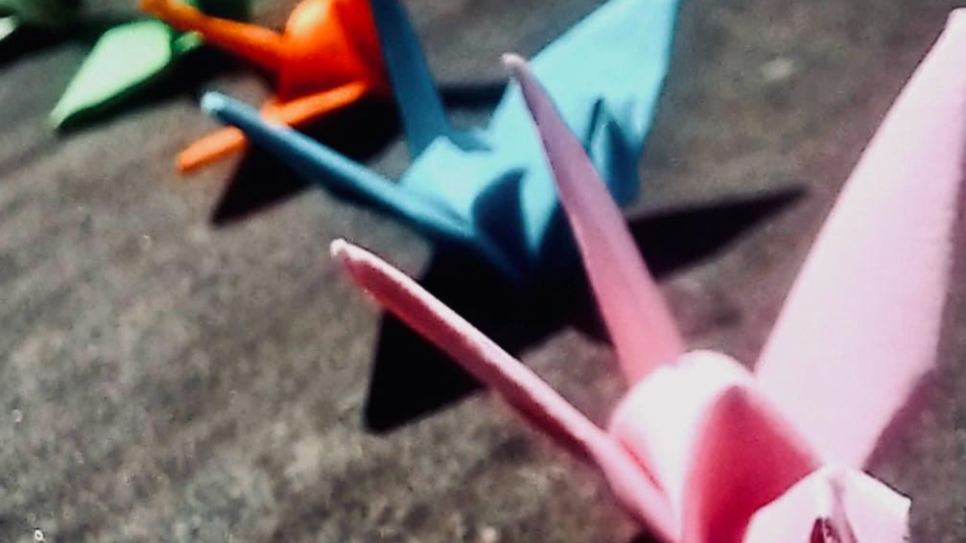Hibakusha by Cian Ciarán
6th of August, 12-6pm, Cerrrig yr Orsedd, National Eisteddfod of Wales, Wrexham
A minute silence was held at 12pm
To coincide with the 80th anniversary of the devastating Hiroshima nuclear bombing in 1945, composer Cian Ciarán debuted an audio installation at the ceremonial heart of the National Eisteddfod.
The Super Furry Animals musician has produced a spatial audio experience that invited Wrexham National Eisteddfod 2025 festivalgoers to contemplate and reflect on the thousands of lives lost to the bomb at the Eisteddfod’s revered Cerrig yr Orsedd ceremonial stones.
Inspired by Cian’s visits to Japan – as well as conversations with survivors of Fukushima and their families – ‘Hibakusha’ is one of the art projects being presented during the Year of Wales and Japan – a year-long celebration of the connections between the two nations.
The soundscape blends Cian’s early childhood memories of growing up in north Wales in the shadow of the Cold War, surrounded by nuclear power stations, with the discovery of life stories of the Hibakusha – people who were directly affected by the bombing – a relative of whom he met with during a visit to Fukushima in 2013.
Cian’s six-hour installation – reflecting the flight of the Enola Gay aircraft from take-off to releasing the ‘Little Boy’ bomb over the Japanese city – began after a minute silence to mark the anniversary and consisted of 12 speakers that surrounded the stone circle to create a 360-degree audio experience. Following a minute of silence at 12:00, people were invited to spend a minute or more to meditate and to reflect on all those across the world who are suffering / have suffered because of war.
The musician hoped the experience would encourage others to consider the effects of Hiroshima and inspire peace building, echoing the Eisteddfod’s core ceremonial call and response of ‘A Oes Heddwch?’ (‘Is There Peace?’). Participants were also be given a paper crane – symbolic of Sadako Sasaki’s international children’s peace movement – a reminder of the need to actively build peace and, like paper, how brittle it can be. A minute’s silence also took place at the Eisteddfod to mark the anniversary.
“I think given the current geopolitical political climate it’s more important than ever for us to reflect, and this piece acted as a timely reminder of the catastrophic effects war and conflict can have on people’s lives,” Cian said.
“The Eisteddfod Genedlaethol is symbolic, and it has always offered a space for reflection and peace building. I made the conscious decision not to perform because I wanted people to focus on the subject, themselves and their experience in the installation.”
The piece is one of more than 20 art projects and collaborations that form the Wales Japan 25 Culture Programme. Led by Wales Arts International, the international agency of Arts Council of Wales, in partnership with Welsh Government and the British Council, the cultural programme is a key element of the Year of Wales and Japan 2025 designed to deepen creative and economic connections between the two countries.
The programme will spotlight the unique creative values shared between Wales and Japan, with a particular focus on cultural wellbeing, sustainability, and indigenous languages. Aligned with the Well-being of Future Generations (Wales) Act, the initiative supports creative collaborations rooted in equality, climate action, and community connection.
As part of the National Eisteddfod programme of events, Cian appeared alongside campaigner Catharine Huws Nagashima, a Welsh migrant to Japan, to reflect on the importance of remembrance to build peace. Titled ‘Cofio, Cofio, Cofio’, the pair spoke at the event on stage with Jill Evans, Is-Gadeirydd Academi Heddwch Cymru/ Academi Heddwch Cymru Vice-Chair, Wales’ first “peace institute”.
Jill Evans said: “Hibakusha remembers the thousands killed in Hiroshima and Nagasaki eighty years ago. Visitors to the National Eisteddfod had a chance to think about the terrible and lasting impact of the use of nuclear weapons. In 1982 Wales declared itself nuclear-free and by becoming a Nation of Peace today we could demonstrate our resolve to work towards a peaceful future for all. That is the national conversation we need. In today’s global community this is more important than ever.”
Eluned Hâf, Head of Wales Arts International, said: "The year of Wales and Japan provides our two nations with the opportunity to share reflections and to learn from one another through arts and culture.
“Hibakusha is poignant sonic arts installation invited visitors to the Eisteddfod a chance to reflect on the awful impact of the Hiroshima nuclear bomb within the peace of the symbolic circle of stones.
While observing a minute’s silence at the Orsedd Stone Circle and on the Main Stage, the following statement was shared on behalf of the Eisteddfod and all the partners:
To remember the tragic event in Hiroshima 80 years ago, a minute’s silence was held to remember the people who were affected, known as Hibakusha. It was an event to remember the lives lost, the families destroyed, and the memories that continue to echo through the generations.
By doing so we called for peace that defeats fear, for dialogue that replaces violence, and for the ability to build a word where respect and empathy lead the way.
Eighty years ago to the day, in the Eisteddfod Pavilion in Rhosllannerchrugog, the competing was interrupted to announce the end of the second world war. This year the competing was interrupted again to plead for peace across the world.
May the minute of silence be a warning and hope that we should never repeat those wrongs.

